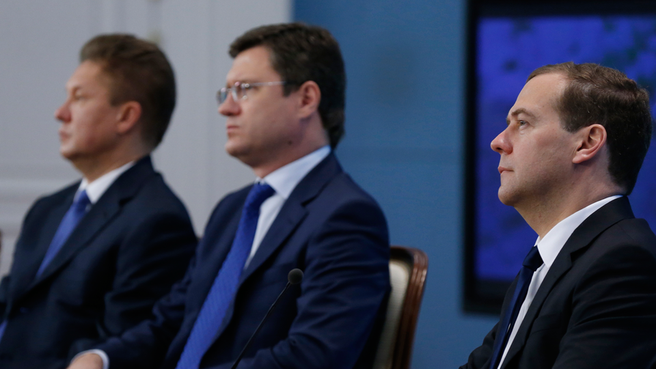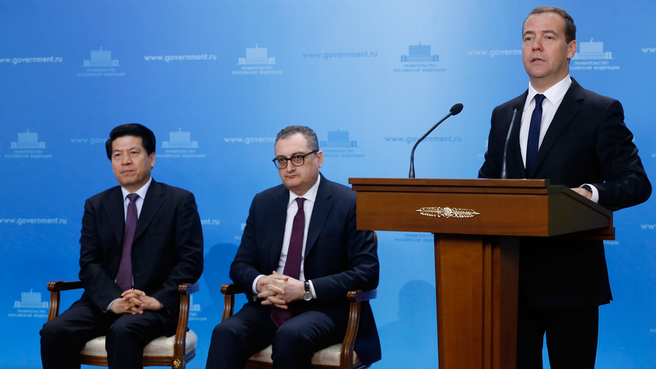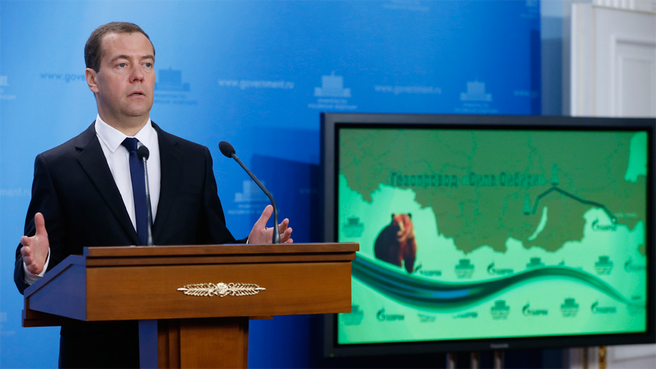The ceremony was held as a videoconference with Moscow, Beijing and Heihe.
Remarks by Wang Yilin, Chairman of the China National Petroleum Corporation
Remarks by Zhang Gaoli, First Vice Premier of the People's Republic of China
Excerpts from the transcript:
Wang Yilin (Chairman of the China National Petroleum Corporation, via interpreter): On 1 September 2014, Russia hosted a groundbreaking ceremony for the Power of Siberia pipeline, attended by Russian President Vladimir Putin andZhang Gaoli, First Vice Premier of the People's Republic of China. Today, we are holding a ceremony to mark the start of construction of China’s leg of the Sino-Russian Eastern route gas pipeline during a videoconference in Beijing, Moscow and the construction site in the city of Heihe.
On 21 May 2014, the China National Petroleum Corporation and Gazprom signed a contract for gas deliveries via the Eastern route in the presence of Chinese and Russian leaders. Under this document, Russia will deliver gas to China from 2018 for a period of 30 years, and it will expand annual delivery volumes to 38 billion cubic metres. In August 2014 and in May 2015, this contract was approved by the Governments of China and Russia, and it has already entered into force. China’s leg of the Sino-Russian Eastern route gas pipeline starts at a station in the city of Heihe, Heilongjiang province, and stretches eastwards to its terminus in Shanghai. The 3,170-km pipeline crosses nine provinces: Heilongjiang, Jilin, Inner Mongolia, Liaoning, Hebei, Shandong, Tianjin, Jiangsu, and Shanghai. Nine underground gas reservoirs will be built.
Dmitry Medvedev: Indeed, this project became possible only due to an extremely high level of truly strategic cooperation between Russia and China.
Construction of the gas pipeline will considerably expand our energy cooperation, as well as cooperation in affiliated industries, and it will provide powerful impetus to deepening cooperation between Russian regions and those in the People’s Republic of China.
Construction of the Power of Siberia pipeline was launched ten months ago and is proceeding as planned. I don’t doubt the fact that everyone involved in this project will fulfil their obligations on time and in full.
The gas pipeline’s route will pass along the Eastern Siberia–Pacific Ocean (ESPO) oil trunk pipeline that has linked Siberian oilfields with the Asia Pacific market. This will make it possible to streamline overall energy spending and infrastructure expenses.
Russia’s large mineral deposits in its eastern regions and the creation of local transport corridors will make it possible to create a new gas delivery route for the People’s Republic of China and our other partners. The Power of Siberia pipeline will allow us to expand gas exports and to provide gas to our Far Eastern and Eastern Siberian regions more quickly. The route has been chosen in such a way as to provide gas to as many Russian cities and villages as possible. And this means that we will improve people’s living standards, we will improve the regional environment, and we will be able to establish cost-effective production facilities, to create jobs there, to make the economy more competitive, and to attract additional investment in these territories.
We are planning to continue cooperating with our Chinese friends in the oil and gas sector and in other areas, including the civilian nuclear power industry, the coal industry, power engineering, and developing new sources of energy. I’m confident that we will soon finalise agreements for building the second Russian-Chinese gas pipeline along the western route.
Zhang Gaoli (First Vice Premier of the People's Republic of China, via interpreter): In September 2014, I arrived in Russia to attend the groundbreaking ceremony for the Power of Siberia pipeline in Yakutsk together with President Vladimir Putin. Today, we are launching construction of the Chinese leg of this gas pipeline, marking the start of what will become a continental energy corridor uniting China and Russia. Total gas deliveries along this route will exceed one trillion cubic metres. The 30-year project is worth over $400 billion. It is rightly considered a major long-term strategic gas project in the world. Implementation of this project is helping turn Russia’s resource-based advantage into an economic advantage. It will develop the economies of regions located along this route, which is very important for diversifying the energy strategy of both countries and ensuring their energy security. This project will certainly have a very positive influence on the structure of global energy cooperation.
We are ready to work with our Russian partners and focus all our resources and efforts on making sure construction goes smoothly and the pipeline begins operating in 2018 as planned.
China and Russia are each other’s largest neighbours and all-round strategic partners. As countries with full-fledged markets, they should increase mutual support in the future, expand mutual openness, and deepen mutually beneficial cooperation, which is in the long-term interests of both countries and also underwrites regional and global development and prosperity.
Both sides are proceeding from their long-term economic interests and the realities in each country, and they should enjoy the full benefit of the advantages offered by the complementarity of our economies. They should actively promote the implementation of major joint energy projects, including long-term crude oil trade, the East-West gas pipeline, the development of oil and gas fields, as well as the integrated development of thermal power stations and power engineering. We need to promote comprehensive cooperation in the non-raw materials sector, including the development of a wide-body aircraft, heavy helicopters, construction of the Moscow-Kazan high-speed railway, construction of a trans-border railway bridge between Nizhneleninskoye and Tonjiang. We need to continue expanding mutually beneficial investment cooperation in the manufacturing, financial and agriculture sectors and for the development of the Russian Far East. We need to successfully implement joint construction projects related to the Silk Road economic belt and the Eurasian Economic Union.














